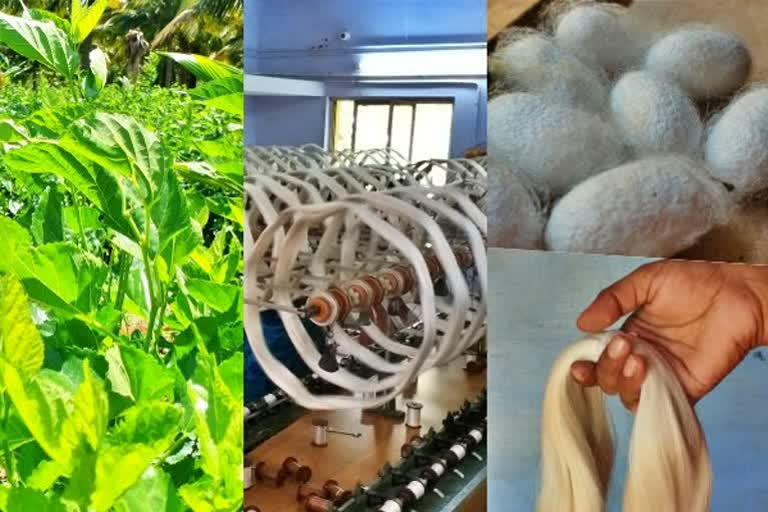Thenkasi: Sericulture industry that was once thriving in India has taken a bad hit due to the coronavirus pandemic and now silk farmers worry that if the Central and State governments do not take necessary action for the revival of sericulture, it would get weaker day by day.
Sericulture is one of the most lucrative agricultural activities in the world as it does not involve expenditures for water, fertilizers and labours.
A large number of farmers in Thenkasi are involved in sericulture as it requires proper climatic conditions. Farmers who were involved in rearing yellow cocoons initially are now showing interest in rearing white cocoons.
Cultivation of mulberry plants is the primary and most important step in sericulture. Around 4000 mulberry plants could be cultivated in an acre of land. Mulberry plants, once planted, would provide benefits for 20 years. Following the cultivation of mulberry plants, a cot-like setup, to prevent excessive wind and heat, should be set up for rearing the silkworms.
The farmers buy egg blocks from the Department of Sericulture for rearing.
Initially, the farmers bought eggs for rearing silkworms but now they directly buy 7-day old worms for the purpose. The worms are fed with mulberry leaves every morning and evening for a month after which harvesting takes place. Harvesting 100kgs of egg blocks would produce cocoons of the same quantity. But only 70% to 80% are being harvested due to problems given by rodents like rats and squirrels.
However, silk farming has now been affected due to corona lockdown. While more than 100 farmers in Thenkasi were involved in sericulture, the lockdown has made a lot of them quit.
Also read: Woman Dalit panchayat chief humiliated in Tamil Nadu
Maariappan, who is involved in sericulture for more than 20 years, said, “We spend lakhs of money to set up the beds needed for silkworm rearing. Before lockdown, we used to sell one kg of white cocoons at a price range of Rs.400 - Rs.500 but currently, we are selling it at a range of Rs.100 - Rs.150 while the production cost is Rs.250. Sericulture can recoup foreign exchange. Around Rs.50 should be given as a subsidy for each kilogram. Hundreds of farmers have given up silkworm rearing as the selling prices have fallen during the lockdown.”
“If the Central and State governments take steps to promote such kind of agriculture, there would be no need to import from western countries and we could reduce foreign exchange. If the government remains ignorant, then there is a chance for silkworm farming to be weakened day by day resulting in its disappearance someday,” he added.
Kilos of white cocoons are being procured by the Department of Sericulture office in Thenkasi from the farmers. These cocoons are boiled in water and extracted into threads using machines.
Commenting on this, Ms Nishanthi, Joint Director of sericulture, said, “Thenkasi is the leading district in silk rearing among the southern districts. Subsidies and equipment needed to set up beds for silkworm rearing are being provided by the Department of Sericulture with the view of involving many farmers in it as sericulture is a lucrative industry. The cocoons are being procured during the lockdown also so that the farmers don’t get affected. We are also involved in encouraging the farmers to produce more yield than last year for procurement. We are providing advice to women on farming as this kind of farming could be done at home itself. ”
According to social activists, many farmers show interest and involvement in sericulture as it could be carried out for about 10 months a year. With complete guidance and support of the government, the farmers would be able to reach the goal of exporting silk to China.
Also read: Tamil Nadu denies fault in Mullaperiyar Dam, files affidavit




